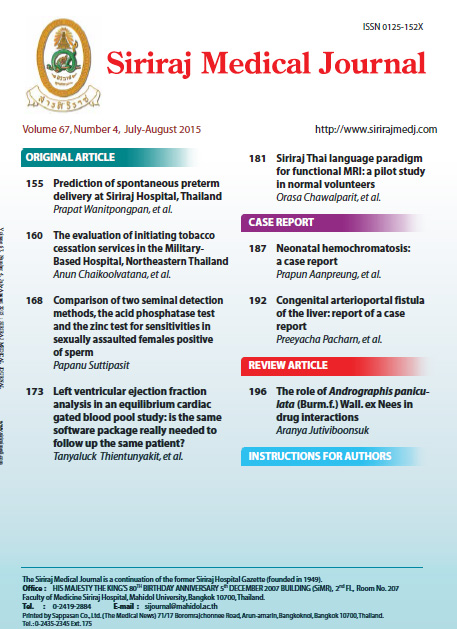Siriraj Thai Language Paradigm for Functional MRI: A Pilot Study in Normal Volunteers
Abstract
Objective: To create a language paradigm in Thai for functional MRI (fMRI) study.
Methods: Ten normal Thai native speakers with right-handedness from Edinburgh’s score underwent fMRI study (BOLD on 3T MR scanner) using created Thai version of language paradigm (SiTP1) with block paradigms of word generation(WG) from Thai letters, verb generation (VG) from nouns, naming pictures (NP), and sentence completion (SC). Individual and group analysis was done using SPM8 to obtain activated areas and lateralization index (LI).
Results: Participants were5 males and 5 females (22 to 37 years old). Eight were post-graduate students, one was a residential training fellow and the other one had grade 12 education. In group analysis (whole brain calculation), WG indicated left lateralized (LI = 0.7). The VG and SC paradigm gave ambiguous result (LI = 0.13 and -0.11 respectively), whereas the NP paradigm gave weakly right lateralization (LI = -0.26). For the frontal and parietal lobe, all paradigms gave strong left LI index. Comparison of LI between frontal lobe and parietal, temporal or whole brain from each paradigm were significantly different (p<0.05). For frontal lobe only, no significant difference was found between each paradigm except between VG and NP (p=0.016).
Conclusion: There was good lateralization using the created Thai paradigm. Regional calculation from frontal lobe gave the best result. The result supported possibility of using it as an alternative tool to identify the dominant hemisphere in Thai patients.
Keywords: Functional MRI, Thai, language
Downloads
Published
How to Cite
Issue
Section
License
Authors who publish with this journal agree to the following conditions:
Copyright Transfer
In submitting a manuscript, the authors acknowledge that the work will become the copyrighted property of Siriraj Medical Journal upon publication.
License
Articles are licensed under a Creative Commons Attribution-NonCommercial-NoDerivatives 4.0 International License (CC BY-NC-ND 4.0). This license allows for the sharing of the work for non-commercial purposes with proper attribution to the authors and the journal. However, it does not permit modifications or the creation of derivative works.
Sharing and Access
Authors are encouraged to share their article on their personal or institutional websites and through other non-commercial platforms. Doing so can increase readership and citations.











